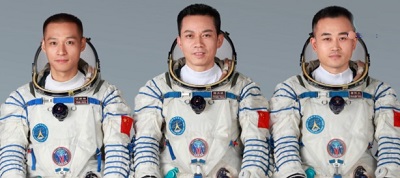Beijing, (Samajweekly) China has sent its youngest-ever astronaut crew aboard the Shenzhou-17 manned spaceship to its Tiangong space station.
The three astronauts: mission commander Tang Hongbo, 48, former fighter pilots Tang Shengjie, 34, and Jiang Xinlin, 35 will stay in orbit for about six months on a space station mission, Xinhua reported.
The spaceship, atop a Long March-2F carrier rocket, blasted off at 11:14 a.m. Thursday Beijing Time from the Jiuquan Satellite Launch Center in northwest China, according to the China Manned Space Agency (CMSA).
About 10 minutes after the launch, the Shenzhou-17 spaceship separated from the rocket and entered its designated orbit. The crew members, consisting of Tang Hongbo, Tang Shengjie and Jiang Xinlin, are in good shape and the launch is a complete success, the CMSA said.
The Shenzhou-17 crew has the youngest lineup since the construction of China’s Tiangong space station started.
Tang Hongbo, born in 1975, is the mission commander and a veteran astronaut once launched into orbit on the Shenzhou-12 mission in June 2021. Tang Shengjie, born in 1989, is a new face and also the youngest astronaut to enter China’s space station. Jiang Xinlin, born in 1988, is also a newcomer to space.
They will perform various in-orbit space science and application payload tests and experiments, Lin Xiqiang, deputy director of the CMSA, announced at a press conference on Wednesday.
They will carry out extravehicular activities, install extravehicular payloads and conduct space station maintenance and other tasks, Lin said.
The Shenzhou-17 astronauts will do extravehicular experimental maintenance for the first time, which is a very challenging task, Lin added.
With space debris increasing, their impact on long-term operating spacecraft is inevitable, Lin said. “Through preliminary inspections, we have found that the solar wings of the space station had been hit by tiny space particles several times, causing minor damages.”
“Of course, we already took this into consideration in the design stage. At present, all functionality and performance indicators of the space station meet requirements,” he added.
The spacecraft is also carrying a batch of biotechnology experiment samples for space protein molecular assembly and application research, including proteins, polypeptides, nucleic acids, biomaterials and medicines.
The experiments will help researchers study the effects of the microgravity environment and radiation on molecular structure, biological function, drug efficacy and pharmacology, guiding the design and development of molecular drugs.
The astronauts will also work on the research and development of biodegradable bionic bones, and their work will be of great significance to bionic biotechnology, the report said.










